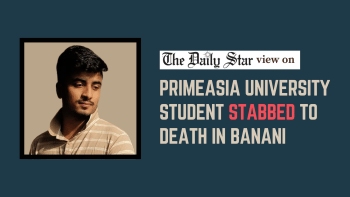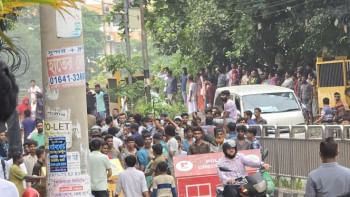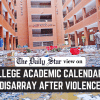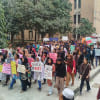A tragic waste of youthful energy

In what is becoming a tedious display of ego clashes and false heroics, students of Dhaka College and Dhaka City College have again turned the streets around their campuses into battlegrounds, leaving the general public to suffer the consequences. Given how routine such conflicts involving the two colleges have become, this is no longer just about who or what started it off; any excuse seems enough to unleash violence. On Tuesday, it was the allegation of a Dhaka College student being assaulted the previous day, leading to an attack on the City College premises as well as hours of chase and counter-chase as police struggled to contain the situation. Many, including police officials, were injured. It's painful to see this meaningless cycle of violence among students who are supposed to lead the nation one day.
According to a report, this is the fifth time that students of these colleges clashed in the last four months. City College students were also involved in a separate clash with their peers from Ideal College earlier this year. As police and witnesses have noted, often trivial matters ignite clashes, leading to repeated disruptions, injuries, and property damage. The surrounding areas, dense with markets and educational institutions, bear the brunt of these outbursts. For commuters and small businesses, every such episode means lost time, lost income, and a growing sense of insecurity. For the students involved, it is a tragic waste of youthful energy, and it has a damaging effect on all other students as well.
This tendency for violent outbursts seems to be increasing in the country. Only days ago, a third-year student of Primeasia University was stabbed to death in broad daylight over a petty argument. The ease with which young people now resort to violence—even over minor personal slights—suggests a deeper malaise caused by decades of authoritarian and undemocratic practices, whose effects continue even after the uprising. There is a possibility that this culture of impulsive aggression could harden into a long-term norm if we do not act urgently.
Equally alarmingly, this tendency for violent outbursts seems to be increasing in the country. Only days ago, a third-year student of Primeasia University was stabbed to death in broad daylight over a petty argument. The ease with which young people now resort to violence—even over minor personal slights—suggests a deeper malaise caused by decades of authoritarian and undemocratic practices, whose effects continue even after the uprising. There is a possibility that this culture of impulsive aggression could harden into a long-term norm if we do not act urgently.
It is, therefore, not enough to blame the police for the failure to prevent vandalism at City College, as its authorities did. This vandalism or violence is not just a law enforcement problem; it goes much deeper, and all must do their part to resolve it. Dhaka College and City College administrations must work closely with law enforcement to impose strict disciplinary measures, enhance monitoring on and around campuses, and ensure swift punishment for any acts of violence. The role of social media groups in fuelling tensions must also be addressed. We urge the interim government and political parties—whom feuding students often draw their strength from—to treat this issue with the seriousness it deserves.


 For all latest news, follow The Daily Star's Google News channel.
For all latest news, follow The Daily Star's Google News channel. 







Comments